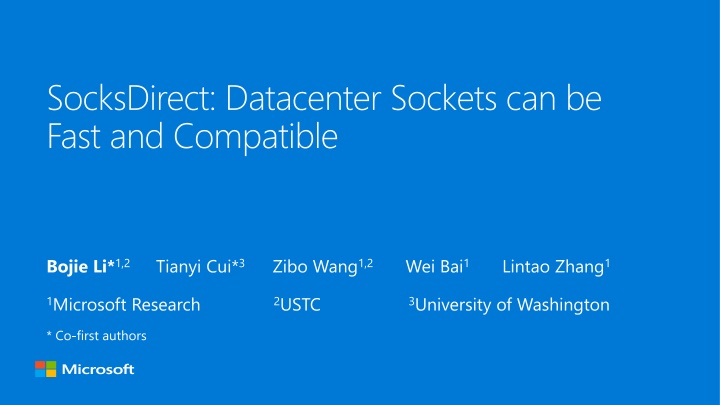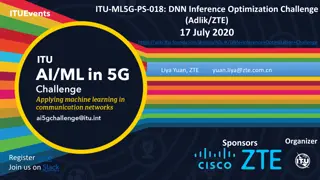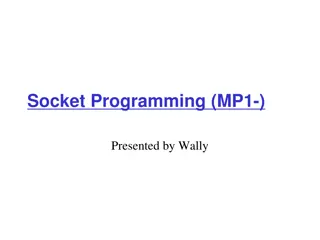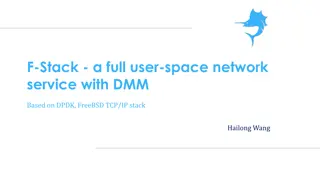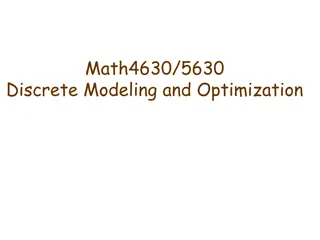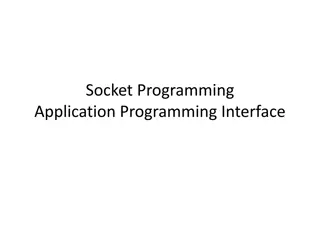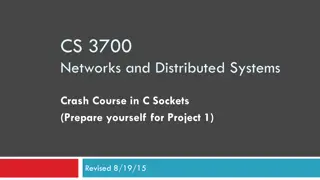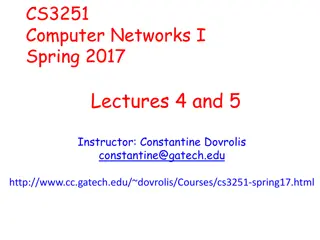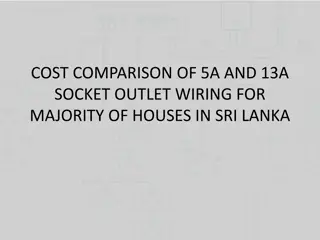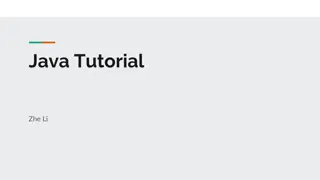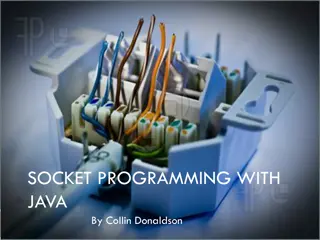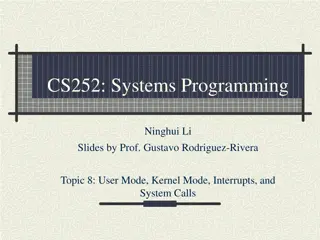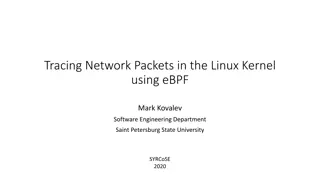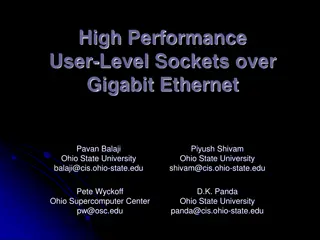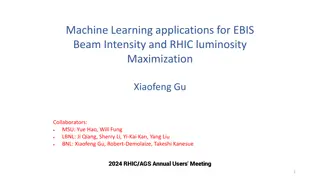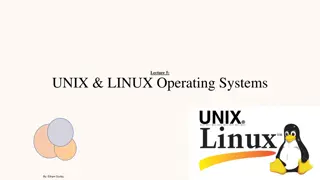High Performance Socket Systems Kernel Optimization User-space
The study delves into the efficiency of socket communication primitives, system bottlenecks, and latency breakdowns in high-performance socket systems. It examines performance bottlenecks, hardware transport latency, and user-space TCP/IP offload to RDMA NICs.
Download Presentation

Please find below an Image/Link to download the presentation.
The content on the website is provided AS IS for your information and personal use only. It may not be sold, licensed, or shared on other websites without obtaining consent from the author.If you encounter any issues during the download, it is possible that the publisher has removed the file from their server.
You are allowed to download the files provided on this website for personal or commercial use, subject to the condition that they are used lawfully. All files are the property of their respective owners.
The content on the website is provided AS IS for your information and personal use only. It may not be sold, licensed, or shared on other websites without obtaining consent from the author.
E N D
Presentation Transcript
SocksDirect: Datacenter Sockets can be Fast and Compatible Bojie Li*1,2 Tianyi Cui*3 Zibo Wang1,2 Wei Bai1 Lintao Zhang1 1Microsoft Research 2USTC 3University of Washington * Co-first authors
The Socket Communication Primitive Server Client socket() bind() listen() accept() recv() send() close() socket() connect() send() recv() close()
Socket: a Performance Bottleneck Socket syscall time >> user application time Kernel time User application time NSC DNS SERVER 92% 8% REDIS KEY-VALUE STORE 87% 13% NGINX HTTP LOAD 77% 23% LIGHTTPD HTTP SERVER 78% 22% Socket latency >> hardware transport latency Inter-host (vs. RDMA) 30 1.6 Intra-host (vs. shared memory) 11 0.25 0 5 10 15 20 25 30 35 Linux Socket shared memory (SHM) / RDMA
High Performance Socket Systems Kernel Optimization User-space TCP/IP Offload to RDMA NIC User App User App User-space VFS User-space TCP/IP User App User-space VFS User App User App User-space VFS User-space TCP/IP User App User-space VFS Kernel VFS Kernel TCP/IP NIC RDMA API Hardware-based Transport NIC packet API NIC packet API Host 1 Host 1 Host 1 TCP/IP RDMA TCP/IP Host 2 Host 2 Host 2 NIC packet API Kernel NIC packet API User-space Stack NIC RDMA API User-space VFS User App User App User App IX, Arrakis, SandStorm, mTCP, LibVMA, OpenOnload FastSocket, Megapipe, StackMap Rsocket, SDP, FreeFlow
Linux Socket: from send() to recv() Sender Host Receiver Host Application Application send() socket call recv() socket call Wakeup process C library C library send() syscall recv() syscall OS OS Lock Process Scheduling Lock VFS send VFS recv Copy data, free mem Event Copy data, allocate mem Notification TCP send buffer TCP recv buffer TCP/IP TCP/IP Network packet Network packet Packet processing (netfilter, tc ) Packet processing (netfilter, tc ) Network packet Network packet NIC NIC Network packet
Round-Trip Time Breakdown Type Overhead (ns) Linux LibVMA RSocket SocksDirect Inter-host Intra-host Inter-host Intra-host Inter-host Intra-host Inter-host Intra-host Total 413 177 209 53 C library shim 12 10 10 15 Per operation Kernel crossing (syscall) 205 N/A N/A N/A Socket FD locking 160 121 138 N/A Total 15000 5800 2200 1300 1700 1000 850 150 Buffer management 430 320 370 50 TCP/IP protocol 360 260 N/A N/A Packet processing 500 N/A 130 N/A N/A Per packet NIC doorbell and DMA 2100 N/A 900 450 900 450 600 N/A NIC processing and wire 200 N/A 200 N/A 200 N/A 200 N/A Handling NIC interrupt 4000 N/A N/A N/A N/A Process wakeup 5000 N/A N/A N/A Total 365 160 540 381 239 212 173 13 Copy 160 320 160 13 Per kbyte Wire transfer 160 N/A 160 N/A 160 N/A 160 N/A
SocksDirect Design Goals Compatibility Drop-in replacement, no application modification Isolation Security isolation among containers and applications Enforce access control policies High Performance High throughput Low latency Scalable with number of CPU cores
SocksDirect: Fast and Compatible Socket in User Space Monitor Process ACL rules Process 1 Event queue Process 2 Event queue Data send Data recv Shared Buffer Application connect Application accept Request queue Request queue User Mode Kernel Mode Monitor: user-space daemon process to coordinate global resources and enforce ACL rules. Processes as a shared-nothing distributed system: use message passing over shared-memory queues.
SocksDirect Supports Different Transports for Data User App User App Mem Queue Mem Queue Monitor Host 1 libsd libsd TCP/IP NIC Packet API Mem Queue NIC RDMA API RDMA TCP/IP NIC RDMA API Host 3 No SocksDirect Host 2 TCP/IP libsd User App User App Monitor
Remove the Overheads (1) Type Overhead Linux RTT (ns) SocksDirect RTT (ns) Inter-host Intra-host Inter-host Intra-host Total 413 53 C library shim 15 15 Per operation Kernel crossing (syscall) 205 N/A Socket FD locking 160 N/A Total 15000 5800 850 150 Buffer management 430 50 TCP/IP protocol 360 N/A Packet processing 500 N/A N/A Per packet NIC doorbell and DMA 2100 N/A 600 N/A NIC processing and wire 200 N/A 200 N/A Handling NIC interrupt 4000 N/A N/A Process wakeup 5000 N/A Total 365 160 173 13 Copy 160 13 Per kbyte Wire transfer 160 N/A 160 N/A
Remove the Overheads (2) Type Overhead Linux RTT (ns) SocksDirect RTT (ns) Inter-host Intra-host Inter-host Intra-host Total 413 53 C library shim 15 15 Per operation Kernel crossing (syscall) 205 N/A Socket FD locking 160 N/A Total 15000 5800 850 150 Buffer management 430 50 TCP/IP protocol 360 N/A Packet processing 500 N/A N/A Per packet NIC doorbell and DMA 2100 N/A 600 N/A NIC processing and wire 200 N/A 200 N/A Handling NIC interrupt 4000 N/A N/A Process wakeup 5000 N/A Total 365 160 173 13 Copy 160 13 Per kbyte Wire transfer 160 N/A 160 N/A
Token-based Socket Sharing Socket is shared among threads and forked processes. Optimize for common cases. Be correct for all cases. Many to one Many to one Lock Sender 1 Sender 1 Queue Receiver Queue Receiver Sender 2 Sender 2 Send token One to many One to many Lock Receiver 1 Receiver 1 Sender Queue Sender Queue Receiver 2 Receiver 2 Receive token Transfer ownership of tokens via monitor.
Handling Fork Transport limitations: RDMA QP cannot be shared among processes. Linux semantics requirement: File descriptors need to be sequential (1,2,3,4,5 ). Sockets are shared for parent and child processes. Parent process FD Table RDMA QP RDMA QP 3 3 5 (COW) SHM (shared) Socket Data Socket Data 5 Shared pages FD Table SHM (shared) SHM Queue 3 3 3 4 4 4 4 5 RDMA QP SHM (private) Socket Data FD Table 3 (on demand) 5 (COW) 5 5 Child process
Remove the Overheads (3) Type Overhead Linux RTT (ns) SocksDirect RTT (ns) Inter-host Intra-host Inter-host Intra-host Total 413 53 C library shim 15 15 Per operation Kernel crossing (syscall) 205 N/A Socket FD locking 160 N/A Total 15000 5800 850 150 Buffer management 430 50 TCP/IP protocol 360 N/A Packet processing 500 N/A N/A Per packet NIC doorbell and DMA 2100 N/A 600 N/A NIC processing and wire 200 N/A 200 N/A Handling NIC interrupt 4000 N/A N/A Process wakeup 5000 N/A Total 365 160 173 13 Copy 160 13 Per kbyte Wire transfer 160 N/A 160 N/A
Per-socket Ring Buffer head head tail tail Traditional ring buffer SocksDirect per-socket ring buffer Many sockets share a ring buffer Receiver segregates packets from the NIC Buffer allocation overhead Internal fragmentation One ring buffer per socket Sender segregates packets via RDMA or SHM address Back-to-back packet placement Minimize buffer mgmt. overhead
Per-socket Ring Buffer send_next head RDMA write data tail Sender side Receiver side RDMA write credits (batched) Two copies of ring buffers on both sender and receiver. Use one-sided RDMA write to synchronize data from sender to receiver, and return credits (i.e. free buffer size) in batches. Use RDMA write with immediate verb to ensure ordering and use a shared completion queue to amortize polling overhead.
Remove the Overheads (4) Type Overhead Linux RTT (ns) SocksDirect RTT (ns) Inter-host Intra-host Inter-host Intra-host Total 413 53 C library shim 15 15 Per operation Kernel crossing (syscall) 205 N/A Socket FD locking 160 N/A Total 15000 5800 850 150 Buffer management 430 50 TCP/IP protocol 360 N/A Packet processing 500 N/A N/A Per packet NIC doorbell and DMA 2100 N/A 600 N/A NIC processing and wire 200 N/A 200 N/A Handling NIC interrupt 4000 N/A N/A Process wakeup 5000 N/A Total 365 160 173 13 Copy 160 13 Per kbyte Wire transfer 160 N/A 160 N/A
Payload Copy Overhead Why both sender and receiver need to copy payload? Sender Receiver Mem App Mem NIC NIC App send(buf, size); Network packet DMA read DMA to socket buf D M A memcpy(buf, data, size); Notify event (epoll) DMA read Wrong data user_buf = malloc(size); recv(user_buf, size); Copy socket buf to user buf
Page Remapping Sender Receiver Send physical page Virtual addr Virtual addr New page Old page Data page Problem: page remapping needs syscalls! Map 1 page: 0.78 us Copy 1 page: 0.40 us Solution: batch page remapping for large messages Map 32 pages: 1.2 us Copy 32 pages: 13.0 us
Remove the Overheads (5) Type Overhead Linux RTT (ns) SocksDirect RTT (ns) Inter-host Intra-host Inter-host Intra-host Total 413 53 C library shim 15 15 Per operation Kernel crossing (syscall) 205 N/A Socket FD locking 160 N/A Total 15000 5800 850 150 Buffer management 430 50 TCP/IP protocol 360 N/A Packet processing 500 N/A N/A Per packet NIC doorbell and DMA 2100 N/A 600 N/A NIC processing and wire 200 N/A 200 N/A Handling NIC interrupt 4000 N/A N/A Process wakeup 5000 N/A Total 365 160 173 13 Copy 160 13 Per kbyte Wire transfer 160 N/A 160 N/A
Process Wakeup Overhead Problem: multiple processes share a CPU core Linux process wakeup (mutex, semaphore, read): 2.8 ~ 5.5 us Cooperative context switch (sched_yield): 0.2 us Solution: Pin each thread to a core Each thread poll for some time slice, and sched_yield after then. All threads on the core run in round-robin order.
Summary: Overheads & Techniques Kernel crossing (syscall) Monitor and library in user space. Shared-nothing, use message passing for communication. TCP/IP protocol Use hardware-based transports: RDMA / SHM. Locking of socket FDs Token-based socket sharing. Optimize common cases, prepare for all cases. Buffer management Per-socket ring buffer. Payload copy Batch page remapping. Process wakeup Cooperative context switch.
Evaluation Setting User App User App Mem Queue Mem Queue Monitor Host 1 libsd libsd Mem Queue NIC RDMA API RDMA NIC RDMA API Host 2 libsd User App Monitor
Latency Intra-host Inter-host
Throughput Intra-host Inter-host
Multi-core Scalability Intra-host Inter-host
Application Performance Nginx HTTP server request latency
Limitations Scale to many connections RDMA scalability: under high concurrency, NIC cache miss will degrade throughput. Recent NICs have larger cache. Connection setup latency: future work. Congestion control and QoS Emerging RDMA congestion control (e.g. DCQCN, MP-RDMA, HPCC) and loss recovery (e.g. MELO) mechanisms in hardware. QoS: OVS offload in RDMA NICs, or use programmable NICs. Scale to many threads Monitor polling overhead
Conclusion Contributions of this work: An analysis of performance overheads in Linux socket. Design and implementation of SocksDirect, a high performance user space socket system that is compatible with Linux and preserves isolation among applications. Techniques to support fork, token-based connection sharing, allocation- free ring buffer and zero copy that may be useful in many scenarios other than sockets. Evaluations show that SocksDirect can achieve performance that is comparable with RDMA and SHM queue, and significantly speedup existing applications.
High Performance Socket Systems Kernel Optimization FastSocket, Megapipe, StackMap Good compatibility, but leave many overheads on the table. User-space TCP/IP Stack IX, Arrakis, SandStorm, mTCP , LibVMA, OpenOnload Does not support fork, container live migration, ACLs Use NIC to forward intra-host packets (SHM is faster). Fail to remove payload copy, locking and buffer mgmt overheads. Offload to RDMA NIC Rsocket, SDP , FreeFlow Lack support for important APIs (e.g. epoll). Same drawbacks as user-space TCP/IP stacks.
The Slowest Part in Linux Socket Stack Application socket send / recv Application pipe read / write Virtual File System Virtual File System TCP/IP Protocol Loopback interface 10 us RTT 0.9 M op/s tput 8 us RTT 1.2 M op/s tput TCP/IP protocol is NOT the slowest part!
Payload Copy Overhead Solution: page remapping C B Receiver Sender B 2 1 RDMA write B A B C
Socket Queues Monitor 3: S1 R1, 4: S1 R2, 5: S2 R2 Sender Receiver R1 3 Socket Queues FD 3 S1 3,4 4 S2 5 R2 4,5 5
Connection Management Connection setup procedure
Token-based Socket Sharing Takeover: transfer token among threads. Takeover request Sender 1 Monitor Receiver Data Queue Send token Takeover request Sender 2 Send token
Rethink the Networking Stack SocksDirect eRPC LITE Application Socket RPC LITE Communication primitive Software Stack HW/SW work split RDMA Packet RDMA NIC
